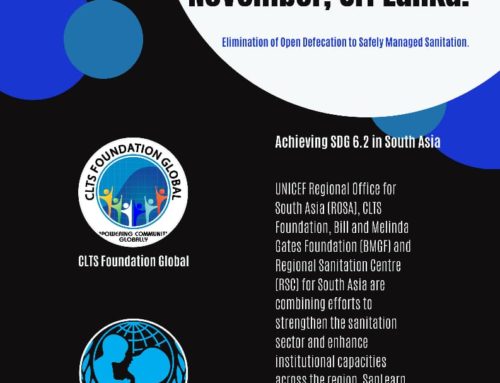By Amit Sengupta
Kolkata, 14 December 2015: CLTS Foundation Global was invited to participateat the 13th International Conference and Exhibition on Sustainable Habitat and Smart Cities titled ‘Municipalika – Sustainable Smart Cities’ on 9-11 December 2015 at Jaipur.In our presentation, CLTS Foundation Global emphasized the vital role of engaging the community as equal partners in achieving sustainable and total sanitation solutions in the process of creating smart cities.
Preetha Prabhakaran who represented CLTS Foundation Global framed sanitation as a public health issue and drew attention to the fact that sanitation and hygieneare an intricate part of addressing the challenges posed by rapid urbanization. She emphasized the vital role and importance of urban sanitation in the context of the country’s upcoming Smart Cities.
Sanitation is a public good that delivers health benefits only when everyone or at least an overwhelming number of people ensures safe confinement of excreta. For this, technology alone is not the solution as it is most important to engage people meaningfully in aspects of their own health and development.
Ms. Prabhakaran highlighted that the traditional mainstream approaches of solving sanitation problems through an infrastructure focus alone had failed over the years. “Subsidized toilet construction by the government faces the twin challenges of universal toilet coverage as well as total usage. It has been shown that only toilets built out of a felt need by a household’s own efforts is likely to be used. As we already see around us, open defecation will continue even if one can somehow ensure subsidized toilets for an entire community,” she said at the conference on 10th December.
“Instead it is important to empower people to bring about collective behaviour change within their communities. This will happen only when the focus is not on toilets as a solution but on having an open defecation free (ODF) environment where not even a single person in the community defecates in the open,” said the Programme Manager, Knowledge Management and Partnerships, CLTS Foundation Global.
She spoke about the importance of Urban Community Led Total Sanitation (UCLTS) approach that targets collective behaviour change, prompting action by an entire community to confine excreta safely by constructing toilets to achieve the objective of an ODF environment. In her presentation, she cited the successful example of Kalyani Municipality (an urban local body in West Bengal) that became the first ODF urban town in India in 2009. Collective action by the community to secure safe sanitation for themselves had consequently led to other community action and gains in terms of collective cleaning of clogged drains, building roads, and securing electricity and water connections for every household.
Kalyani Municipality offers valuable lessons for replication in other municipalities. It presents a winning model of equal partnership between the municipality and the community based on a demand driven approach by the community, she further elaborated.





Leave A Comment